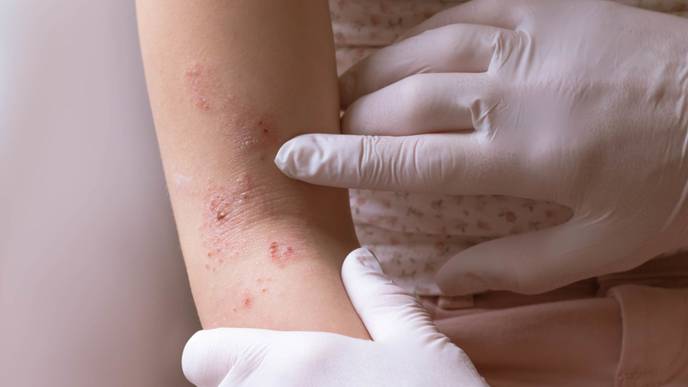ReachMD
Be part of the knowledge.™Dupilumab Provides Long-Term Benefits and Reduction of Concomitant Therapy Use in Patients With Atopic Dermatitis

Dupilumab is effective for the long-term treatment of moderate to severe atopic dermatitis (AD), with benefits lasting up to 30 to 36 months after treatment initiation. These study findings were published in Dermatology and Therapy.
RELIEVE-AD, also known as Early Real-World Patient Evaluation for Dupixent in Atopic Dermatitis, was a prospective, observational study in which researchers aimed to evaluate the effectiveness of dupilumab over a 1-year period in adults with moderate to severe AD. During the treatment period, patients improved and reported reductions in flares, itch, nonitch skin symptoms, sleep disruptions, and use of concomitant AD therapies.
The researchers conducted a prospective, longitudinal, real-world follow-up survey to assess long-term outcomes following dupilumab therapy in patients with AD. They invited 698 adult patients with moderate to severe AD who had participated in RELIEVE-AD, a US manufacturer patient-support program, to participate in a new survey about their long-term experiences with dupilumab.
The original group of patients had initiated treatment with dupilumab for AD in a clinical setting for 30 to 36 months. They were also surveyed 12 months after dupilumab initiation. Both the 12-month (baseline) and the current surveys included questions about use of additional AD therapies, AD symptoms and disease control, flares; nonitch skin symptoms; sleep problems; health-related quality of life (HRQOL), and treatment satisfaction, regardless of current dupilumab use.
“
This study showed that long-term dupilumab treatment provides continued improvement in symptoms, treatment satisfaction, disease control, and quality of life in adults with moderate-to-severe AD while reducing the need for other AD treatments.
Among the original 698 patients in RELIEVE-AD, a total of 425 (61%) completed the new survey. Demographic and clinical characteristics were similar between the original and new survey participants. The researchers noted that 127 of the 425 patients (18%) permanently discontinued dupilumab, most commonly owing to lack of efficacy (26%) and adverse effects (20%). Dupilumab was discontinued by an additional 25 patients who subsequently restarted treatment at least once. More than 97% of patients reported adhering to the prescribed injection schedule at all times.
In the current survey at 30 to 36 months after dupilumab initiation, respondents reported all results (disease control, flares, nonitch skin symptoms, sleep problems, HRQOL, and treatment satisfaction) as being similar to or incrementally better than the 12-month self-reported results, showing significant benefits vs baseline (P <.001).
The patients reported significant reductions from baseline in concomitant use of other AD therapies as well, with 54% currently not using other medications vs 13% at baseline after 12 months of dupilumab treatment. Almost 83% of patients reported using over-the-counter emollients in the 12-month baseline survey vs less than 59% in the current survey.
Approximately 75% of patients who reported global itch as being “very much better” (vs before starting treatment), 81% reported adequate disease control, 85% reported meaningful improvement in QOL, and 87% were satisfied with their treatment (with 76% stating they were extremely satisfied or very satisfied).
Compared with 3% of patients at baseline reporting no days of intense episodes of itching over the past week, 59% of current patients reported no intense itching over the past week. Compared with approximately 78% of patients at baseline reporting sleep disturbance over the past week, only 13% reported sleep problems in the past week.
Significant study limitations include the self-selected population (patients who maintained long-term efficacy and safety may have been more likely to volunteer to participate in the current survey). Similarly, the fact that patients were recruited through a dupilumab patient support program may have influenced their perception of treatment benefit. Recall bias may represent another potential limitation.
“Among patients with moderate-to-severe AD who completed the survey, patient-reported benefits achieved at 12 months were maintained at 30–36 months,” the researchers concluded. They added, “… long-term dupilumab treatment provides continued improvement in symptoms, treatment satisfaction, disease control, and quality of life in adults with moderate-to-severe AD while reducing the need for other AD treatments.”
Disclosure: This research was supported bySanofi and Regeneron Pharmaceuticals Inc.
Some study authors declared affiliations with biotech, pharmaceutical, and/or device companies. Please see the original reference for a full list of disclosures.
Facebook Comments